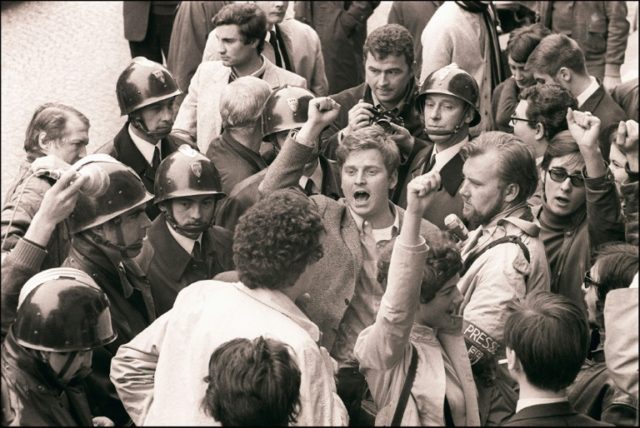Paris (AFP) – As France prepares to mark the 50th anniversary of one of the most tumultuous months of its history, experts say the May 1968 generation remains largely true to its youthful aims of greater personal freedom and social justice.
Their findings are surprising given the enduring myth about the instigators of the upheaval that paralysed France with mass protests by students and striking workers.
For decades the student leaders have been portrayed as hot-headed and often wealthy who quickly abandoned their anti-capitalist ideals once they got a taste of the privileges of power.
For the men, that meant the form-fitting corduroy jackets and Mao collars of their youth were exchanged for tailored suits that mask the bulk of their expanding waistlines.
They became newspaper editors like Serge July, co-founder of the left-leaning Liberation, government officials such as former health minister Bernard Kouchner, or environmentalists like Daniel Cohn-Bendit, once known as “Danny the Red”.
While acknowledging their progressive bonafides — Kouchner helped found the NGO Doctors Without Borders — critics claim they’ve bulked up their bank accounts handsomely in the process.
French ex-president Nicolas Sarkozy famously in 2007 called for a “liquidation” of the legacies of the ’68 era, denouncing “all these politicians who give lessons they would never follow themselves.”
Some critics go so far as to accuse the “soixante-huitards” (sixty-eighters) of introducing unbridled individualism and frenzied consumerism — in short, an unforgivable “Americanisation” of French society.
They point to Cohn-Bendit as well as physicist Alain Geismar, director Romain Goupil and many other former student leaders who have now rallied behind Emmanuel Macron, the ex-banker often branded as the “president of the rich”.
Yet sociologists say their studies are conclusive: Despite a few high-profile cases, the overwhelming majority of May ’68 protesters remain steadfast supporters of their egalitarian “revolution”.
– ‘Strong faith in the left’ –
“When you look at the anonymous participants, those who did not necessarily write down their experiences, you realise the common line about the May ’68 generation turning its back on the cause in order to take powerful jobs is completely false,” said Julie Pagis at France’s National Center for Scientific Research (CNRS).
Of the 170 families she examined for a book on the subject, “just one person” crossed to the right of the political spectrum.
“There is a strong faith in the left or the far left”, Pagis said. “More than half still pursue activist activities” and are regular faces at public protests, including demonstrations against 40-year-old Macron’s various reform plans.
At a recent march in the southern city of Montpellier, one protester carried a sign proclaiming: “I can’t run as fast as in ’68, but I yell louder”.
French historian Pascal Ory said the libertarian spirit of May ’68 has also infused many of the new social combats that have emerged in recent years such as feminism, anti-racism and the ecology movement.
– Shunning the mainstream –
Isabelle Sommier, a sociologist, noted that many of the “leftist militants” now in their seventies remain “significantly engaged” against infrastructure projects they say pose environmental risks.
She cited in particular the long-contested airport at Notre-Dame-des-Landes in western France, which the government recently abandoned in the face of decades of entrenched protests.
For Olivier Fillieule, a professor at Lausanne University in Switzerland, most members of the May ’68 generation have actually paid a price for their political activism, in terms of social alienation or diminished job prospects.
“The stereotype of the student who sold out is a baseless theory” proffered by critics who would blame the movement “for all the ills of society over the past 50 years,” Fillieule said.
Focusing on the handful of “celebrities” who joined the ranks of the wealthy elite is like comparing “the Who’s Who to a phone book,” he added.
Most have shunned the mainstream routes to success, remaining committed to a social utopia of grassroots democracy and freedom from the shackles of tradition.
As Pagis puts it: “The want to keep on changing the world, using other means.”

COMMENTS
Please let us know if you're having issues with commenting.